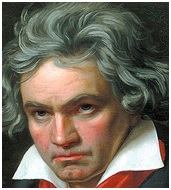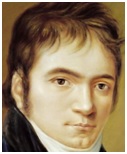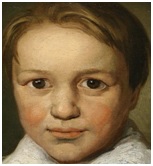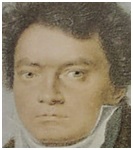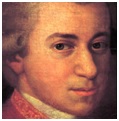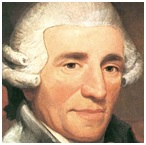|
 |
|
 |
|
|
||
Ludwig van Beethoven - Creativity and Music
Ludwig van Beethoven (1770-1827)
German composer (pictured right). His masterpieces include his nine symphonies. 20,000 people attended his funeral in Vienna where he lived most of his life.
Why was he so creative?
1. Customer satisfaction He always aimed to delight and move his audiences by giving his music great power and emotion. “Music should strike fire from man, and bring tears from the eyes of woman”, he said.
2. Imaginative revolutionary He continually tried new ways of composing by breaking the existing rules of music. Beautifully original was his combination of:
3. Freedom Beethoven (pictured right in 1803) was the first musician who became rich from composing music. So he had the freedom to write what and when he liked. But he was also motivated by a desire to make money. “I do not write what I most desire to, but what I need to because of money”, he said.
4. Love of music He was totally absorbed in his work His music saved him from the despair of his deafness.
5. Courage and determination He had to overcome:
a) poverty in childhood He had to leave school at 11 to earn money because of his alcoholic father. He is pictured right aged 13.
b) deafness in his last 10 years (when he composed some of his most brilliant works like the Ninth Symphony).
He was incredibly determined to be successful and never gave into despair or suffering. His deafness only once forced him to attempt suicide in 1802, but his music and determination pulled him through. 6. Relaxation and reflection Beethoven (pictured right as a young man):
He started his Fifth Symphony in 1804 and finished it in 1808!
7. Inspiration and perspiration Beethoven:
8. Single-mindedness Beethoven (pictured right in 1814) lived for his music and never married, despite having many sweethearts. During his writing, he lived in another world, forgetting everyday matters like meals, cleanliness and housework. “I live entirely in my music”, he said.
9. Self-confidence He had enormous belief in his ability, helped by his huge natural talent. He made his first public performance as a pianist at the age of seven!
10. Lifelong learner Despite his genius, he was humble enough to continually learn from anything that might improve his music. For example, he learned from:
He was a passionate believer in continuous improvement. “Art demands of us that we shall not stand still”, he said. Key quotes on music and creativity I live entirely in my music. From the heart – may it return to the heart. Music should strike fire from the heart of man and bring tears from the eyes of woman. Music is a higher revelation than all wisdom and philosophy.
Key quotes on time management I will seize fate by the throat.
Key quote on stress and pain This is the mark of a really admirable man: steadfastness in the face of trouble.
Key quote on children Recommend to your children virtue; that alone can make them happy, not gold.
Key quote on quality Art demands of us that we shall not stand still. |
|
|
||
|
|
||
| Copyright © wisdomtowin.com 2025 All Rights Reserved | ||
|


